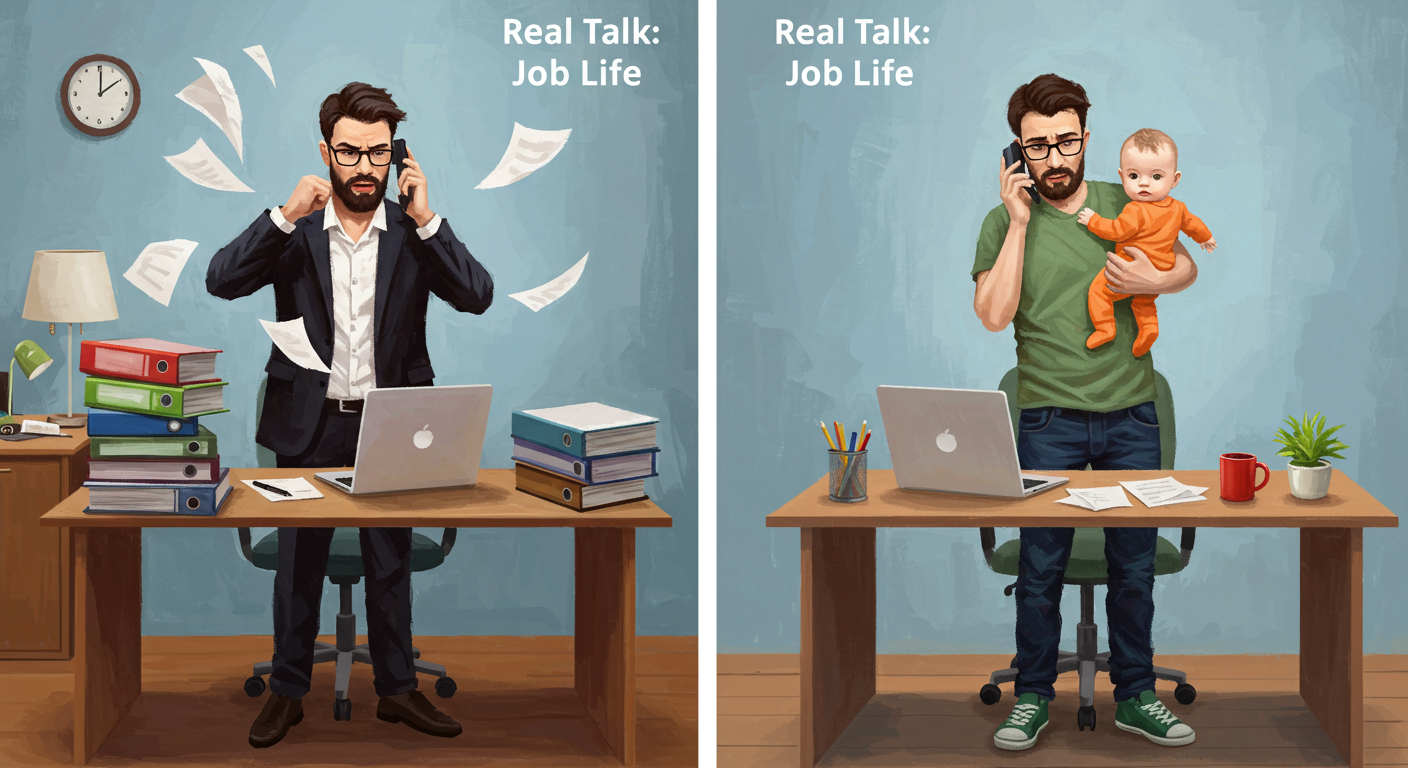Look, we need to have an honest conversation about work life. And I mean really honest – the kind where we drop all the LinkedIn polish and professional facade and just… talk about what it’s actually like out there.
You know those perfectly curated career posts you see online? The ones where everyone’s crushing their goals and living their best professional life? Yeah, well, that’s about 10% of the reality. The other 90%? That’s what we’re diving into today.
The Real Talk Nobody Wants to Have
Here’s the thing – and I’m just gonna say it straight up – most of us had zero clue what we were getting into when we first started working. Like, seriously zero. I remember thinking my biggest challenge would be whether I could handle the actual work tasks. Ha! If only it were that simple.
The truth is, the work itself? That’s usually the easy part once you get the hang of it. It’s everything else that’ll throw you for a loop. The office dynamics, the unwritten rules, the politics (oh god, the politics), and just… the sheer weirdness of spending 40+ hours a week with the same group of people.
What They Don’t Tell You in Career Counseling
First off, can we talk about how nobody prepares you for office politics? I mean, office politics creates stress and relies on power dynamics to flourish, leading to inconsistencies like favoritism, but somehow this never comes up in those “How to Succeed in Your Career” articles.
You walk into your first job thinking it’s gonna be like school – you know, work hard, get good grades, everyone’s happy. But then you realize that work involves dealing with people, and that means finding a compromise between what they want and what you want; and it’s often a zero-sum game. Suddenly you’re navigating personality conflicts, competing priorities, and trying to figure out who actually makes the decisions around here.
And honestly? Sometimes the person with the fanciest title isn’t the one calling the shots. Sometimes it’s Karen from accounting who’s been there for fifteen years and knows where all the bodies are buried. You learn this stuff the hard way.
The First Job Reality Check
Let’s be real about getting that first job, because wow, what a journey that is. Much of life is about showing up, but it’s also crucial to know where to show up. Sounds simple enough, right? Except nobody tells you where “where” actually is.
I’ve seen people with perfect GPAs struggle to find work while others with mediocre grades land amazing opportunities. Why? Because they figured out the networking game early. They showed up to the right places, talked to the right people, and weren’t afraid to put themselves out there.
But here’s what really gets me – this whole “you need experience to get experience” catch-22. Employers want someone with “real world work experience,” but how are you supposed to get that if no one will hire you without it? It’s maddening.
The Experience Paradox
The funny thing about work experience is that half the time, employers don’t even know what they mean when they ask for it. Recently, a marketing manager told a recent grad they lacked “real world work experience” even though they had campus jobs and internships. Like, what exactly makes experience “real world”?
Is it the soul-crushing commute? The fluorescent lighting? The passive-aggressive email chains? Because let me tell you, dealing with difficult customers at a campus job is pretty darn real.
The truth is, experience can be tough to find for entry level candidates but you may have more than you realize. That part-time retail job? You learned customer service, time management, and how to stay calm under pressure. That group project from hell? Congratulations, you’ve got team leadership experience and conflict resolution skills.
The Daily Grind – What Work Actually Looks Like
Okay, so you’ve got the job. Now what? Well, buckle up, because daily work life is… an experience.
The Morning Routine That Isn’t Routine
First things first – mornings are rough. And I don’t mean just the getting up early part (though that sucks too). I mean the mental shift from “sleepy human” to “professional person who has their life together.” Some days you nail it, other days you’re googling “how to look awake” at 9 AM.
The commute becomes this weird liminal space where you’re mentally preparing for the day ahead. Or if you’re working from home, it’s that bizarre transition from pajama pants to… well, pajama pants with a nice shirt for video calls.
The Unspoken Rules
Here’s something they don’t teach you in school – every workplace has its own ecosystem of unwritten rules. When is it okay to leave? How long should you actually take for lunch? Is it weird to eat at your desk? What’s the deal with the break room microwave that’s been broken for three months but nobody talks about it?
You spend your first few months just… observing. Trying to figure out the social dynamics without stepping on any toes. Who can you joke around with? Who takes everything super seriously? Which meetings are actually important and which ones could have been an email?
And don’t even get me started on email etiquette. The passive-aggressive “As per my last email…” The mysterious “Let’s circle back on this.” The dreaded “We need to discuss.” It’s like learning a whole new language where everything has hidden meanings.
The Politics You Didn’t Sign Up For
A staggering 79 percent of adults in employment commonly experience work-related stress, and a huge chunk of that comes from office politics. Nobody warns you about this stuff in job interviews.
You’ll have coworkers who take credit for your ideas. Managers who play favorites. Team members who throw others under the bus to save their own skin. And somehow, you’re supposed to navigate all this while still getting your actual work done.
The thing is, office politics aren’t something you can sit out. Most people look down upon them, but the truth is, they are a part of every organization. You can try to stay above the fray, but eventually, you’ll get pulled in whether you like it or not.
Learning to Play the Game (Without Losing Your Soul)
The key is figuring out how to protect yourself without becoming someone you don’t recognize. It’s about building genuine relationships, not just transactional ones. It’s about speaking up for yourself without throwing others under the bus. It’s about being strategic without being manipulative.
Easy to say, harder to do. We’ve all been there – sitting in a meeting wondering if everyone else got some manual on how to navigate this stuff that somehow missed you.
The Stress Nobody Talks About
Let’s have a moment of honesty here. Work stress is real, and it’s not just about deadlines and workload. Sure, those things matter, but the psychological stuff? That’s what really gets to you.
The Comparison Trap
Social media doesn’t help. Everyone’s posting about their promotions, their amazing team lunches, their work-life balance wins. Meanwhile, you’re over here eating a sad desk salad and wondering if you’re falling behind in life.
But here’s the thing – those highlight reels aren’t the full story. That person posting about their promotion? They probably had months of stress and self-doubt before that moment. The “amazing team” pictures? There’s likely drama and tension that doesn’t make it to Instagram.
The Energy Management Game
Nobody talks about how draining it is to be “on” all day. To be pleasant and professional even when you’re having a rough day. To navigate difficult personalities while maintaining your composure. To solve problems while pretending everything’s fine.
By the time you get home, you’re emotionally and mentally exhausted. And then you feel guilty because you’re too tired to be present for your personal life. It’s this weird cycle where work drains you, then you feel bad about being drained, which makes you more tired.
The Learning Curve That Never Ends
One thing about work life – you’re constantly learning. Not just about your job, but about people, about yourself, about how the world actually works. And honestly, that’s both exciting and overwhelming.
Skills They Don’t Teach in School
Communication is huge. And I don’t mean knowing how to write a professional email (though that helps). I mean reading between the lines, understanding tone and context, knowing when to speak up and when to listen.
Time management becomes this weird juggling act of priorities that keep shifting. Project management skills become essential even if it’s not in your job title. And emotional intelligence? That’s probably more important than any technical skill you’ll learn.
You start to realize that “soft skills” aren’t soft at all – they’re some of the hardest things to master.
Finding Your Rhythm (And Your People)
After a while, things start to click. You find your groove, build relationships, figure out what you’re actually good at. The stress doesn’t go away completely, but you learn how to manage it better.
The Relationships That Matter
Work friends become a lifeline. The people who get your frustrations because they’re living them too. The ones who’ll cover for you when you need to leave early for a doctor’s appointment. The colleagues who become actual friends, not just work acquaintances.
These relationships make everything more bearable. Suddenly, Monday mornings aren’t quite so brutal because you get to catch up with people you actually like spending time with.
Finding Your Voice
At some point, you stop being the new person who’s just trying not to mess up. You start having opinions, making suggestions, pushing back when something doesn’t make sense. It’s scary at first, but also kind of liberating.
You realize that everyone’s just figuring it out as they go. Even the people who seem super confident and put-together are dealing with their own uncertainties and challenges.
The Growth That Sneaks Up on You
Looking back, the growth happens gradually. One day you realize you’re the person someone comes to for advice. Or you handle a crisis with calm confidence instead of panic. Or you speak up in a meeting without your heart racing.
The challenges that used to feel insurmountable become manageable. The people who used to intimidate you become… well, just people. You develop your own style, your own approach, your own professional identity.
The Real Talk Wrap-Up
So, what’s the bottom line? Work life is messy, complicated, sometimes frustrating, occasionally wonderful, and definitely not what you expected. But that’s okay. Actually, that’s more than okay – that’s normal.
The key is being patient with yourself as you figure it out. Everyone’s learning as they go, even the people who’ve been doing this for decades. The workplace is constantly evolving, and we’re all just trying to keep up.
What Actually Matters
At the end of the day, it’s about finding work that doesn’t drain your soul. It’s about building relationships with people who make the hard days easier. It’s about growing and learning and becoming more confident in your own abilities.
Is it always easy? Nope. Is it always fair? Definitely not. Will there be days when you question all your life choices? Absolutely. But there will also be moments of pride, satisfaction, and genuine connection that make it all worthwhile.
The real world work experience everyone talks about? It’s not about having the perfect resume or knowing all the answers. It’s about showing up, doing your best, learning from mistakes, and figuring out how to be human in a professional world.
And honestly? That’s something you can only learn by living it.
Moving Forward
Remember, your career isn’t a race. It’s more like… a really long hike with lots of different paths and unexpected detours. Some days you’ll feel like you’re crushing it, other days you’ll feel lost in the woods. Both are completely normal parts of the journey.
The most important thing is to stay curious, stay kind (to yourself and others), and remember that everyone – and I mean everyone – is just trying to figure it out as they go along.
So take a deep breath, cut yourself some slack, and remember that real work life experience isn’t about being perfect. It’s about being real, being resilient, and showing up anyway – even on the days when you have no idea what you’re doing.
Because let’s be honest, half the time, none of us really know what we’re doing. And somehow, that’s perfectly fine.









